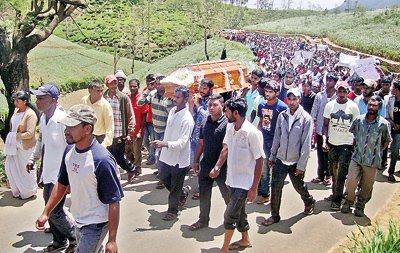News
Pistol-packing police high on power and corruption
An ugly string of police crimes – the latest being the interdiction of a senior officer over the murder of a child – has been blamed by a high-ranking official on a gun-toting war mentality in the force. Last Sunday Nuwara Eliya Police OIC P. Jayaweera was interdicted over the unsolved killing of seven-year-old Niveda in the Magasthota area. She went missing in August and her body was found in a ditch.
An autopsy revealed that her death had been caused by drowning and apparently showed no sign of abuse, and speculation grew over the motives behind the killing. Police inaction in investigations resulted in public protests, and Cabinet Minister A. Thondaman intervened to get the matter expedited.
At Mr Thondaman’s request ASP Chandana Herath issued directives to open a separate inquiry on the issue, which resulted in the uncovering of malpractices in the original investigations and the indictment of OIC Jayaweera for failing to investigate the matter and allegedly suppressing evidence.

The last journey of seven-year-old Niveda whose body was found in a ditch. Pic by Shelton Hettiarachchi
Police are probing claims by residents that the child was killed as she was suspected to have witnessed the earlier murder.
It is widely believed that the murder of Niveda was connected to an earlier murder in the area. The National Police Commission (NPC), which investigates complaints against the police, said it had received 601 complaints from the time of its establishment in April 2012 to December that year. Of these, 143 complaints were about abuse of power, 181 against police inaction, 106 about partiality. 32 about framed charges and 48 about unlawful arrest and detention.
This year, 356 complaints have been received by the commission out of which 117 were about inaction and 89 about abuse of power. Another 65 dealt with partiality and 12 were about assault incidents. “The situation is a result of the war,” said NPC Secretary TMKB Tennekoon. “Due to the war the police, who usually do not handle many weapons, have handled weapons more than any other such force. The mentality of the officers is also different as they still have a war mentality,” he said.
Last Monday, police arrested a constable attached to Tissamaharama Police who is alleged to have stabbed his father-in-law and brother-in-law in a domestic dispute. According to reports the constable had been putting up a fence separating his house and land from that of his father-in-law, and the dispute about the fence resulted in him stabbing his relatives.
Last week, the Thalangama Police OIC, Chief Inspector Upul Perera, the OIC Crime Branch IPKP Kodithuwakku, Sergeant Pushpakumara and a constable were arrested by the Colombo Crime Division (CCD) over covering up the murder of STF Inspector Rohan Thusitha Kumarasinghe after accepting money from Himali Karunaratne, the chief suspect of the case.
According to police reports the four officers had been manipulating the situation to extort money from Ms Karunaratne, threatening action against her.
Mr Tennekoon said that the inferior training given to officers and the lack of duty consciousness in individual members of the force had resulted in the current lawless situation. The general degradation of standards in wider society had also affected the sandard in the police force.
Nimal Mediwake, a former DIG, agrees and pointed out that the pervasive effects of corruption in society had influenced some police. “You can’t expect them to be better as they are part of our society. Coupled with that, the lack of proper police training really affects the quality of police officers,” he said.
He said officers of the rank of inspector and above should be thoroughly educated in criminology and law. “We proposed at the time we were in active duty for all the inspector grade officers to be educated in criminology in the police academy. The officers would graduate with a degree in Law and Criminology, where the main subjects would be criminology, law, English and computer studies.
“This would ensure that the officers are well educated and respected by the public,” Mr Mediwake said. He emphasised the importance of having a rigorous recruitment regime which would take account of all aspects of a candidate’s background.
“When we joined the force our pedigree was well investigated – even if we had a relative who had violated the law we were disqualified. Those practices don’t exist any more but they are needed to ensure that recruits are of high quality,” Mr. Mediwake said.
(Additional reporting by Shelton Hettiarachchi)


